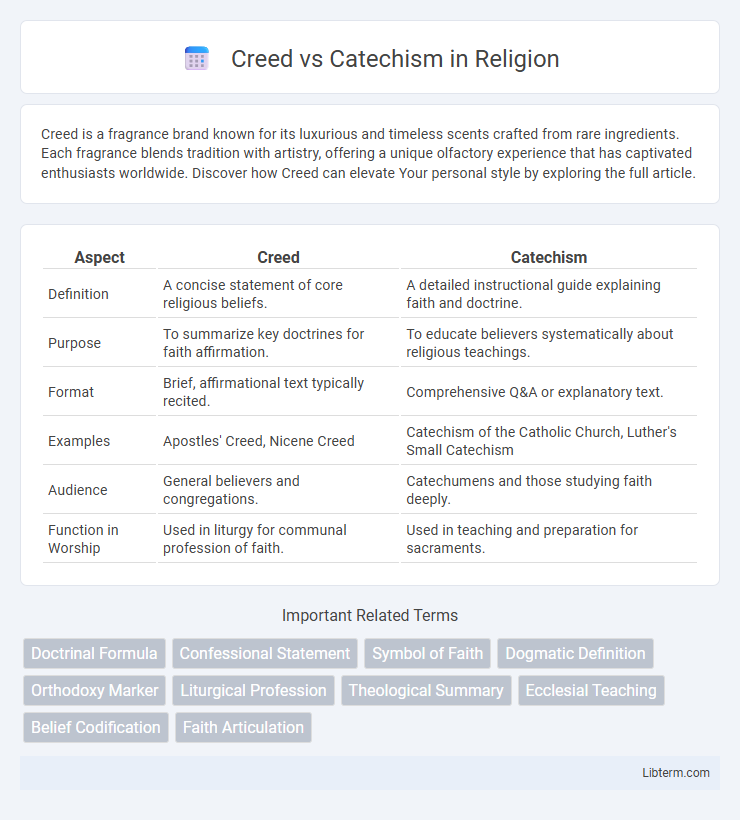Creed is a fragrance brand known for its luxurious and timeless scents crafted from rare ingredients. Each fragrance blends tradition with artistry, offering a unique olfactory experience that has captivated enthusiasts worldwide. Discover how Creed can elevate Your personal style by exploring the full article.
Table of Comparison
| Aspect | Creed | Catechism |
|---|---|---|
| Definition | A concise statement of core religious beliefs. | A detailed instructional guide explaining faith and doctrine. |
| Purpose | To summarize key doctrines for faith affirmation. | To educate believers systematically about religious teachings. |
| Format | Brief, affirmational text typically recited. | Comprehensive Q&A or explanatory text. |
| Examples | Apostles' Creed, Nicene Creed | Catechism of the Catholic Church, Luther's Small Catechism |
| Audience | General believers and congregations. | Catechumens and those studying faith deeply. |
| Function in Worship | Used in liturgy for communal profession of faith. | Used in teaching and preparation for sacraments. |
Understanding Creed and Catechism: Core Definitions
A creed is a formal statement of Christian beliefs that summarizes essential doctrines, often recited in worship to affirm faith, such as the Nicene Creed or Apostles' Creed. Catechism refers to a systematic instructional guide, usually in a question-and-answer format, designed to teach and explain the core principles of Christianity, morality, and doctrine in detail. Understanding the distinction highlights that creeds function as concise declarations of faith, while catechisms provide comprehensive religious education and doctrinal clarity.
Historical Origins of Creeds and Catechisms
Creeds, such as the Nicene and Apostles' Creeds, originated in early Christian councils during the 4th century as formal statements of core Christian beliefs to unify doctrine amidst diverse interpretations. Catechisms developed later, notably post-Reformation, as instructional manuals designed to teach foundational Christian principles through a question-and-answer format, facilitating religious education and doctrinal clarity. Historical roots of creeds reflect ecumenical efforts to define orthodoxy, while catechisms emphasize pedagogical methods for faith formation across various Christian traditions.
Purpose and Function in Christian Doctrine
Creeds serve as concise, authoritative statements summarizing essential Christian beliefs, designed to unify doctrine and affirm faith within the church community. Catechisms function as instructional guides, systematically teaching Christian doctrine through questions and answers to deepen understanding and facilitate religious education. Both tools shape orthodoxy, with creeds emphasizing doctrinal affirmation and catechisms promoting comprehensive doctrinal instruction.
Structure and Format: Creed vs Catechism
Creeds are concise, structured declarations of faith, typically composed of a series of affirmations or articles, designed for memorization and recitation within liturgical settings. Catechisms feature a question-and-answer format that systematically explains doctrines, enabling instructional use for teaching and theological clarification. The creed's linear, declarative structure contrasts with the catechism's dialogical and pedagogical format, optimizing each for distinct roles in religious education and worship.
Key Examples: Apostles' Creed and Westminster Catechism
The Apostles' Creed serves as a foundational Christian statement of belief, summarizing core doctrines about the Trinity, Jesus Christ, and the resurrection in a concise format used broadly across denominations. The Westminster Catechism, developed during the 1640s by the Westminster Assembly, provides a detailed question-and-answer format designed for instructing believers in Reformed theology, emphasizing doctrine, morality, and church practice. Both texts function as vital doctrinal tools, with the Apostles' Creed focusing on core confession and the Westminster Catechism offering systematic theological education.
Role in Worship and Religious Education
Creeds, such as the Nicene Creed, function as concise, formal statements of core Christian beliefs recited during worship to unify congregational faith expression. Catechisms provide structured, detailed teachings through question-and-answer formats used primarily in religious education for instructing individuals in doctrine and moral principles. While creeds emphasize communal affirmation of essential doctrines in liturgical settings, catechisms serve as comprehensive educational tools to deepen personal understanding and doctrinal formation.
Authority and Acceptance Across Denominations
Creeds serve as concise declarations of core Christian beliefs, widely accepted across major denominations such as Catholicism, Orthodoxy, and Protestantism, providing authoritative summaries of faith that underpin doctrinal unity. Catechisms offer detailed instructional frameworks, with variations reflecting denominational distinctives, often used within specific traditions like the Catholic Church's Catechism to guide theological education and moral teaching. The authority of creeds stems from their ecumenical councils and historical consensus, while catechisms gain acceptance through institutional endorsement and catechetical utility within particular Christian communities.
Differences in Theological Emphasis
Creeds emphasize foundational Christian doctrines such as the Trinity, the divinity of Christ, and salvation, serving as concise declarations of faith used in liturgy and baptism. Catechisms systematically present comprehensive teachings, including moral instructions, sacraments, and church traditions, designed for education and spiritual formation. Theological emphasis in creeds centers on core beliefs, while catechisms prioritize detailed doctrinal understanding and practical application.
Modern Relevance and Adaptations
Creeds, such as the Nicene and Apostles' Creed, continue to serve as foundational summaries of Christian faith, providing clarity and unity in modern worship and theological education. Catechisms have adapted by incorporating contemporary language and addressing current moral and social issues, making religious teachings more accessible and relevant to today's diverse audiences. Both creeds and catechisms play vital roles in faith formation, with creeds emphasizing core beliefs and catechisms offering detailed instruction to guide personal and communal spiritual growth.
Creed or Catechism: Which Guides Faith Today?
Creeds, such as the Nicene and Apostles' Creeds, serve as concise, foundational statements of Christian belief that unify faith communities and affirm essential doctrines. Catechisms provide detailed, structured teaching tools that explore and explain these beliefs through questions and answers, facilitating deeper theological understanding and spiritual formation. Today, creeds guide faith by offering a shared declaration of core doctrines, while catechisms support ongoing education and practical application within the church.
Creed Infographic

 libterm.com
libterm.com